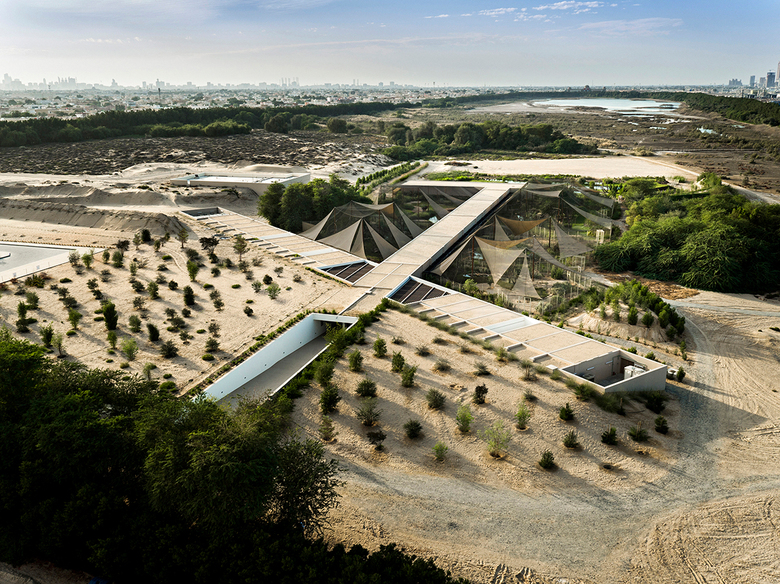2019 Aga Khan Award Winners
Six projects have been announced as winners of the 2019 Aga Khan Award for Architecture. The winners, ranging from the revitalization of a World Heritage site in Bahrain to a wetland center in the UAE, will split the $1 million USD prize.
The announcement was made at a ceremony held in Kazan, Russia, on August 29, 2019, coming four months after twenty projects were shortlisted by the nine-member jury* for the prestigious triennial award. The Aga Khan Award for Architecture was established by His Highness the Aga Khan in 1977 "to identify and encourage building concepts that successfully addressed the needs and aspirations of communities in which Muslims have a significant presence." The awards, now in their 14th cycle, reward the architects involved on the projects but also the "municipalities, builders, clients, master artisans and engineers who have played important roles" in them. This combined focus on Muslim communities and recognition of the various project players have made the Aga Khan Award for Architecture one of the most important awards in architecture, while also drawing attention to projects that would not receive attention in other parts of the world otherwise.
The 2019 Aga Khan Award for Architecture winners, in alphabetical order by country:
- Bahrain: Revitalization of Muharraq
- Bangladesh: Arcadia Education Project, in South Kanarchor
- Palestine: Palestinian Museum, in Birzeit
- Russian Federation: Public Spaces Development Program, in Kazan
- Senegal: Alioune Diop University Teaching and Research Unit, in Bambey
- United Arab Emirates: Wasit Wetland Centre, in Sharjah
Bahrain: Revitalization of Muharraq
Revitalization of Muharraq "highlights the World Heritage site’s pearling history, was first initiated as a series of restoration and reuse projects. The project evolved into a comprehensive program that aimed to re-balance the city’s demographic makeup by creating public spaces, providing community and cultural venues, and improving the overall environment."
Bangladesh: Arcadia Education Project, in South Kanarchor
Arcadia Education Project, in South Kanarchor, "a modular structure – incorporating space for a preschool, a hostel, a nursery and a vocational training centre – [...] takes a novel approach to a riverine site that is often flooded for five months every year. Rather than disrupting the ecosystem to create a mound for building, the architect [Saif Ul Haque Sthapati] devised the solution of an amphibious structure that could sit on the ground or float on the water, depending on seasonal conditions."
Palestine: Palestinian Museum, in Birzeit
Palestinian Museum, in Birzeit, "crowns a terraced hill overlooking the Mediterranean and is the recipient of the LEED Gold certification because of its sustainable construction. The zigzagging forms of the Museum’s architecture and hillside gardens are inspired by the surrounding agricultural terraces, stressing the link with the land and Palestinian heritage."
Russian Federation: Public Spaces Development Program, in Kazan
Public Spaces Development Program, in the Republic of Tatarstan, is "a program that, to date, has improved 328 public spaces all over Tatarstan. The ambitious program sought to counter the trend toward private ownership by refocusing priorities on quality public spaces for the people of Tatarstan. It has now become a model throughout the Russian Federation."
Senegal: Alioune Diop University Teaching and Research Unit, in Bambey
Alioune Diop University Teaching and Research Unit, in Bambey, "a scarcity of resources led to the use of bioclimatic strategies, including a large double roof canopy and latticework that avoids direct solar radiation but allows air to flow through it. By employing locally familiar construction techniques and following sustainability principles, the project succeeded in keeping costs and maintenance demands to a minimum, while still making a bold architectural statement."
United Arab Emirates: Wasit Wetland Centre, in Sharjah
Wasit Wetland Centre, in Sharjah, is "a design that transformed a wasteland into a wetland and functioned as a catalyst for biodiversity and environmental education. While its indigenous ecosystem has been restored, it has also proven to be a popular place for visitors to appreciate and learn about their natural environment."
*The nine members of the 2019 Master Jury:
- Anthony Kwamé Appiah, an Anglo-Ghanaian American philosopher;
- Meisa Batayneh, founder and principal architect of maisam architects & engineers;
- Sir David Chipperfield, whose practice has built over 100 projects for both the private and public sectors;
- Elizabeth Diller, a founding partner of a design studio whose practice spans the fields of architecture, multi-media performance, and digital media;
- Edhem Eldem, a Professor of History at Boğaziçi University (Istanbul) and the Collège de France;
- Mona Fawaz, a Professor in Urban Studies and Planning at the Issam Fares Institute of Public Policy at the American University of Beirut;
- Kareem Ibrahim, an Egyptian architect and urban researcher who has worked extensively in Historic Cairo;
- Ali M. Malkawi, a professor at Harvard University’s Graduate School of Design and a founding director of the Harvard Center for Green Buildings and Cities;
- Nondita Correa Mehrotra, an architect working in India and the United States and Director of the Charles Correa Foundation.






